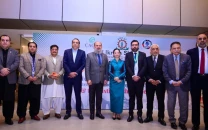Caretaker’s tax-based performance
Interim govt inherited political, economic challenges from predecessor

The caretaker setup assumed control of the federal government of Pakistan in mid-August 2023 under the leadership of caretaker Prime Minister Anwarul Haq Kakar. Since then, it has faced criticism for various measures, despite being a technocratic setup. Generally, this kind of setup is good for initiating necessary actions deemed vital by the state, but can also incite public displeasure. The interim government inherited political, economic, and law and order challenges from its predecessor, the Pakistan Democratic Government (PDM). To address economic challenges such as inflation hike, current account deficit, lack of investor interest due to prevailing uncertainty, and mounting debts, it has focused on bringing foreign exchange to Pakistan through promoting the Information Technology Sector and introducing measures for broadening the tax base through digitisation, among others. No doubt, the performance in the tech sector has remained commendable. Whereas taxation measures have been analysed in the upcoming part of this article.
The most important initiative that has remained the talk of the town pertains to the restructuring of the Federal Board of Revenue (FBR), which the caretaker setup thinks could significantly increase tax revenue and enhance the overall performance of the FBR machinery. The interim government faced backlash from FBR officers too; however, it remained determined and announced the FBR restructuring committee just a week before the general elections, raising questions about the timing of this measure. However, the Election Commission of Pakistan (ECP) refrained from endorsing it, stating that such proposals should be considered by the elected government instead. Measures like these, which could have a significant impact on revenue collection, should never be taken in haste and without thorough consideration.
In this short span of approximately five months, the caretaker setup has also issued multiple Statutory Regulatory Orders [SROs] under the Income Tax Ordinance, 2001 (the Ordinance) read with Income Tax Rules, 2002 (the Rules), and the Sales Tax Act, 1990 (the Act) read with Sales Tax Rules, 2006 (the Rules), to broaden the tax base through digitisation of processes and systems. Credit for this must also be given to the FBR leadership, which has remained very receptive in bringing about changes and ultimately implementing them. The SROs issued under the Ordinance include SRO 1171(I)/2023 dated August 28, 2023, SRO 1588(I)/2023 dated November 21, 2023, SRO 1771(I)/2023 dated December 05, 2023, SRO 1846(I)/2023 dated December 22, 2023, and SRO 1845(I)/2023 dated December 22, 2023, respectively. While the SROs issued under the Act include SRO 1189(I)/2023 dated September 05, 2023, SRO 1185(I)/2023 dated September 05, 2023, SRO 1525(I)/2023 dated November 10, 2023, SRO 1775(I)/2023 dated December 07, 2023, SRO 1788(I)/2023 dated December 11, 2023, SRO 1525-DI(I)/2023 dated December 12, 2023, SRO 1842(I)/2023 dated December 21, 2023, and SRO 28(I)/2024 dated January 10, 2024, respectively.
Read: Does Pakistan need corporate tax reforms?
If the performance of the interim setup is evaluated by focusing on the tax measures taken to promote tax objectives such as documenting the economy, broadening the tax base, and increasing tax revenue, then it can be safely said that it has at least tried to play its role. From bringing rules for record-keeping of beneficial owners to introducing draft SWAPS Rules, which is an initiative to revamp the withholding tax process and further digitise it, the interim setup has been proactive. It has also brought rules for the purpose of section 175A of the Ordinance to provide real-time access to information and databases to the FBR by various specified organisations, which will assist the FBR in multiple ways, including adding those into the tax net who have not yet obtained the registration number and ultimately forcing them to pay their due share of taxes.
If the SROs issued for sales tax are considered, we also find that objectives of taxation are being addressed. For instance, enhancing check posts for the purpose of examining goods and related documents in relation to the supplies of goods originating from tax-exempt areas. The broadening of the scope and applicability of the electronic invoicing system is another landmark achievement of the interim setup, by virtue of which the supply chain of fast-moving consumer goods has been targeted. Further, in another SRO, the scope of Tier-1 retailers has also been enhanced by specifying the threshold for the retailer whose withholding tax is deductible under section 236H of the Ordinance. The perspective also exists in Pakistan that it is not just about issuing SROs, but rather strict implementation should also be done. The upcoming elected government will have a strong responsibility on its shoulders to ensure not only the changes brought about during this period but rather that whatever law is in place is given and implemented in a true sense.
It should always be considered that measures for the improvement of state institutions should not be changed with the shift of power as this impairs their performance. When it comes to investment opportunities, investors are always looking for consistent policies for over a decade or so at least, so that they are comfortable making their decisions with ease, which unfortunately is always missing when we talk about our country Pakistan. Moreover, the interim setup should always consider the constitutional powers it is subject to so that no measures backfire or legal objections are later raised by the honourable courts having competent jurisdiction.
The author is a law graduate with aN ADVANCED DIPLOMA IN INTERNATIONAL TAXATION.
Published in The Express Tribune, February 19th, 2024.
Like Business on Facebook, follow @TribuneBiz on Twitter to stay informed and join in the conversation.



















COMMENTS
Comments are moderated and generally will be posted if they are on-topic and not abusive.
For more information, please see our Comments FAQ